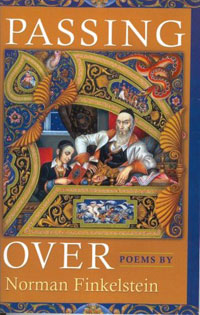Spiritual Sunday
Last week I shared a powerful Passover poem by my friend Norman Finkelstein. Here’s another one, entitled “The Telling,” which also appears in his collection Passing Over (2007).
The title is a reference to the recounting of flight from Egypt at the Passover Seder, known as the Haggadah. The phrase “as it is said” appears regularly, referencing the long tradition of telling. I love Norman’s description of how the Haggadah digresses into explanations of the story’s meaning and then the explanations unfold back into the story. Furthermore, the “politics of exegesis”—the debates over the significance of the Exodus story—are at the heart of Judaism and Israel. As Norman puts it, Jews are “sojourners in the land/sojourning in the word.”
Since then they have seen “death and miracles,” and since then they have multiplied (as God promised Abraham) into “stars without number.” The child that hears the story becomes a nation, although perhaps this child comes away with different impressions of that nation at different points in his or her life:
great, mighty and numerous
quiet studious obedient
hypnotic bold triumphant
“Pithom and Ramses” are the cities that the enslaved Israelites were to build for the pharaoh. The lash probably belongs to the Egyptians, the staff to Moses (“signs and wonders”). The “sons who die” were to have included the infant Moses. There was much crying out then and there has been much crying out since.
Given that Passover is an occasion to focus on the oppressed everywhere, the poem notes that Jews can be victimizers as well as victims. The Egyptians deserve life no less than the Israelites, the Palestinians no less than the Israelis:
go and learn
what they did to us
go and learn
what we did to them
In one of the most disturbing passages in the Haggadah, referenced in Norman’s poem, God says that he himself will be slaughtering the children of the Egyptians:
“And God pulled us out of Egypt.” The Holy One Himself brought us out of Egypt, not by an angel, not by an angel of fire, not even by the hands of a messenger. He himself, He the glorious One, He the blessed One, brought us out of Egypt. As the Bible says: “And I will pass through the land of Egypt on that night, and I will strike down all the firstborn men and beasts in the land of Egypt; and I will execute judgment against all the gods of Egypt, I the Lord.”
“And I will pass through the land of Egypt,” I, and not an angel. “And I will strike down the firstborn in the land of Egypt,” I, and not an angel of fire. “And I will execute judgment against all the gods of Egypt,” I, and not a messenger. “I the Lord, I, and not another.”
Nobel laureate Elie Wiesel has problems with this part of the Haggadah. His status as a concentration camp survivor gives him special credibility when he asks,
Why does God boast of killing innocent children, be they Egyptian? Why does He mention it so often? Is He proud of it? One may study Midrashic and Talmudic sources in search of an explanation. In vain.
It is problematic when we invoke God to justify enemy deaths. In the end Wiesel speculates that maybe God is teaching us that He alone may kill and that no one has the right to imitate Him. Norman, on the other hand, doesn’t try to explain. He just tells:
I and not an angel
I and not a seraph
I and not an emissary
wonders
refers to blood
as it is said
Committed as they must be to truth, poets sometimes they tell us things we don’t want to hear.
The Telling
By Norman Finkelstein
goes forward
circling back on itself
narration digressing
into explanation
explanation unfolding
into narration
and there
he became a nation–
great, mighty and numerous
quiet studious obedient
hypnotic bold triumphant
death and miracles
and stars without number
the land filled with them
Pithom and Ramses
lash and staff
signs and wonders
as it is said
a politics of exegesis
crossing the years
sojourners in the land
sojourning in the word
the sons who die
the daughters who live
until we cried out
until we cry out
go and learn
what they did to us
go and learn
what we did to them
I and not an angel
I and not a seraph
I and not an emissary
wonders
refers to blood
as it is said


